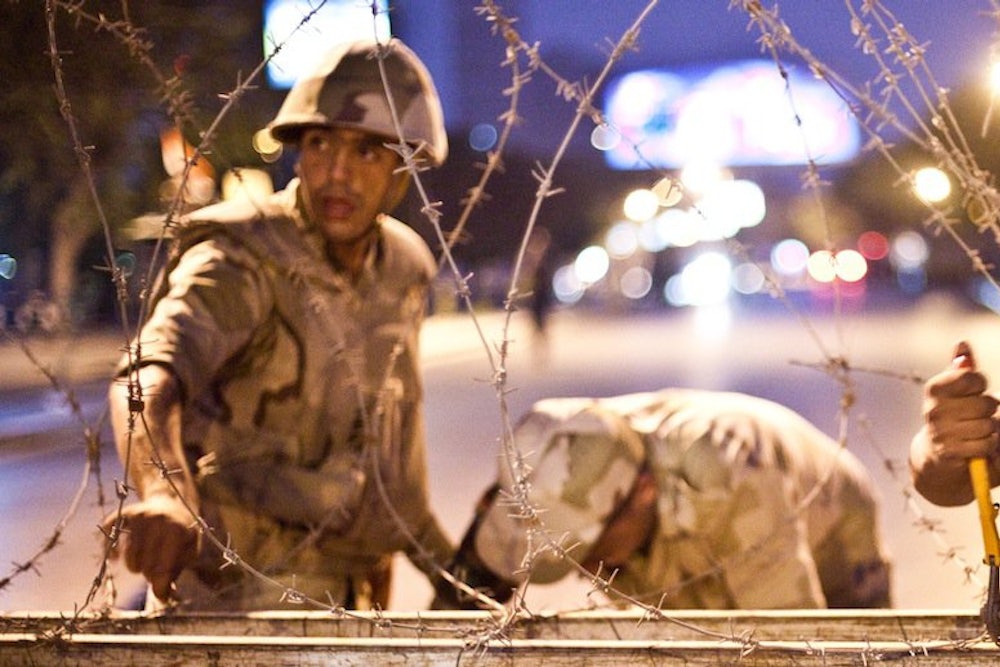Under former President Hosni Mubarak, Egyptians used to say outspoken political dissidents would end up going “behind the sun”—a euphemism that meant you would find yourself in the hands of the State Security Services, and may not find your way back again. A related expression often used during that period was “the walls have ears (that have walls that have ears…)”—it’s the English expression in eternal recurrence. Recently, an Arabic professor in Cairo told me he hadn’t heard either one much in the two and a half years since Mubarak’s ouster. Now, we’ll be using them again, he said wryly.
The brutality of the Egyptian military’s crackdown against supporters of ousted Muslim Brotherhood President Mohamed Morsi shocked many in Egypt and abroad. Since the initial violence, the army and police have rounded up many prominent and less prominent Morsi supporters. Their nets have now expanded to include even former members of the Brotherhood who have not been affiliated with the group for some time.
More surprising, particularly to supporters of the military’s actions, are the charges leveled against two prominent activists, Esraa Abdel Fattah and Asmaa Mahfouz, this past week. Abdel-Fattah is a founding member of the April 6 youth movement and both were heavily involved in the January 2011 peaceful uprisings that led to the unseating of Mubarak. On Saturday, both women found themselves under investigation for “spying for foreign bodies,” according to the state-run news outlet, Al Ahram Online.
Islamists and activists are not the only ones under suspicion. Journalists, both foreign and Egyptian, have been targeted by the new military regime. The government has shuttered the offices of Qatar-based Al Jazeera Arabic, and arrested their correspondent, and at least 12 foreign correspondents have been attacked or detained since Morsi’s ouster, according to the New York Times. An Egyptian journalist for state-run al Ahram was shot at a military checkpoint in the Nile Delta last week.
In the current climate, there is no room for dissenting views, even from one of the most historically respected quarters of Egyptian society. On July 22, a group of 75 judges issued a statement condemning the ouster of president Morsi on the grounds that it was “a breach of the constitutional legitimacy” because, they said, Morsi was “the legitimate elected president” and that they as judges had observed the elections and found them to be “fair, free and transparent.” The statement was issued under the auspices of the Independent Judges’ Trend.
According to Yussef Auf, a Judge in a Giza Court and non-resident Fellow at the Atlantic Council’s Rafik Hariri Center for the Middle East, the members of the group are of mixed political orientations. As to their reasons for opposing the army’s ouster of Morsi, he said, “some of them were against this movement and considered it against democracy and that doesn’t mean they are with Morsi or with the Muslim Brotherhood… also some of them identify politically with Islamic political trends.” Increasingly rare these days, they are an independent voice defying the binary that defines Egypt’s discourse at present.
Still, many Egyptian judges were appointed during the Mubarak era and are deeply reactionary. Two days after the statement was issued, a committee within the judges’ club called “the committee for the defense of judges" issued a statement against them accusing them of affiliation with and bias toward the Muslim Brotherhood. As a result, several of the judges who signed the statement are now under investigation by the Ministry of Justice.
Even among members of an institution that is supposed to be the steward of democracy (quite literally in Egypt, because there is a judge in each polling station overseeing the elections) dissent is not tolerated.
In an increasingly polarized atmosphere that seems likely to only beget more violence—across the country, churches and Copt-owned businesses have been torched in retaliation for the violence and arrest of Morsi supporters—it would seem that what is needed more than anything is a third way. As a group not affiliated with Morsi supporters, despite the political sympathies of some of its members, this group of judges represented an independent voice speaking out against the actions of the army. However, in shutting down any dissent (from the ousted Islamists), the possibility of dissent (from activists with a history of opposition to military rule), or alternate narratives (from journalists), the military, it would seem, is seeking to maintain control of the story, by force if necessary.
In the last two and a half years, while little changed for the better on the economic front and the social and political fabric of Egyptian society grew increasingly divided, one of the most significant shifts that occurred after the January 2011 uprisings was the way that people spoke about politics. The fear that had governed expression of one’s political views seemed to evaporate overnight. Now that most fundamental of gains seems to be under threat.
